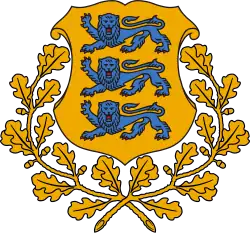Arnold Rüütel
Arnold Rüütel OIH (Estonian pronunciation: [ˈɑrnold ˈryːtel]) (born 10 May 1928)[1] served as the last Chairman of the Presidium of the Supreme Soviet of the Estonian SSR from April 8, 1983, to March 29, 1990, Chairman of the Supreme Soviet of the Estonian SSR (from May 8, 1990: Supreme Council of the Republic of Estonia) from March 29, 1990, to October 6, 1992, and was the third President of Estonia from October 8, 2001, to October 9, 2006. He was the second President since Estonia regained independence in 1991. Rüütel also served as one of fifteen Deputy Chairmen of the Supreme Soviet of the USSR.
Arnold Rüütel | |
|---|---|
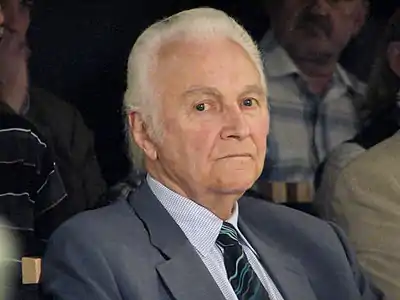 Arnold Rüütel in May 2014 | |
| 3rd President of Estonia | |
| In office 8 October 2001 – 9 October 2006 | |
| Prime Minister | Mart Laar Siim Kallas Juhan Parts Andrus Ansip |
| Preceded by | Lennart Meri |
| Succeeded by | Toomas Hendrik Ilves |
| Chairman of the Supreme Soviet of the Estonian Soviet Socialist Republic (From May 8, 1990: Chairman of the Supreme Council of the Republic of Estonia) | |
| In office 29 March 1990 – 5 October 1992 | |
| Prime Minister | Edgar Savisaar, Tiit Vähi |
| Preceded by | Enn-Arno Sillari |
| Succeeded by | Lennart Meri (as President of Estonia) |
| Chairman of the Presidium of the Supreme Soviet of the Estonian Soviet Socialist Republic | |
| In office 8 April 1983 – 29 March 1990 | |
| Prime Minister | Valter KlausonBruno SaulIndrek Toome |
| First Secretary | Karl VainoVaino Väljas |
| Preceded by | Johannes Käbin |
| Succeeded by | Himselfas Chairman of the Supreme Council |
| Personal details | |
| Born | 10 May 1928 Laimjala Parish, Saaremaa, Estonia |
| Political party | Communist Party (Soviet era) People's Union of Estonia (1994–2001, 2007–2012) Conservative People's Party of Estonia (2012–present) |
| Spouse(s) | Ingrid Rüütel |
| Children | 2 |
| Profession | Agronomist |
| Signature |  |
Childhood
Rüütel born in Pahavalla village in Laimjala Parish, Saaremaa. His parents was Feodor Rüütel (1900−1965) and Juulia Rüütel (1905−1995).[2][3]
During the Soviet era
After the annexation of Estonia to the USSR, he changed his name to the more russified Arnold Fedorovich Ruutel (Russian: А́рнольд Фёдорович Рю́йтель). On April 8, 1983, he was appointed as Chairman of the Presidium of the Supreme Council of the Estonian SSR; thus he was also one of the 15 deputy chairmen of the Supreme Soviet of the USSR. On March 29, 1990, he was elected as Chairman of the Supreme Soviet of the Republic of Estonia. He served during the confirmation of Estonia's independence on August 20, 1991. Rüütel continued in office until October 6, 1992.
Independent Estonia
Rüütel was also a member of the Constitutional Assembly from 1991 to 1992, which drafted the new Constitution of the Republic of Estonia. He stood as a candidate in the first presidential election in 1992. In the first round, where the people voted, Rüütel came first, receiving 43% of the votes. The second round was held in the Riigikogu, whose members voted for the two leading candidates of the first round; there, Rüütel lost to Lennart Meri.
In 1991, Rüütel took his Doctorate in agriculture. He served as Chairman of the People's Union of Estonia from 1994 to 2000, and was elected as a member of the Estonian Parliament, the Riigikogu, in 1995, where he acted as Vice-Chairman until 1997. He ran for President in the 1996 election (this time an indirect election with no popular vote) and lost to Meri once again.
Presidential term
He was elected President by an electoral college on September 21, 2001, defeating Toomas Savi in the final round by votes of 186 to 155. Rüütel was inaugurated as President of the Republic on October 8, 2001. Mart Laar's cabinet eventually fell later the same year. Rüütel announced in his election manifesto that his principal aims would be to reduce the negative effects that Estonia's speedy economic changes had had on a large number of people, and to seek greater solidarity within the society.
2006 candidacy
The end of Rüütel's term was overshadowed by several controversies. On the Independence Day military parade on February 24, 2005, Rüütel repeatedly congratulated soldiers on 'Victory day' (Estonian Victory Day is on June 23), which caused speculation about the then 76-year-old president's mental health.[4] In January 2006, Estonian Television reported that Rüütel's underage granddaughters had organized a party in the presidential palace and drunk alcohol.[5] Later that year, the newspaper Eesti Ekspress published archived documents suggesting that Rüütel as a top functionary of the Estonian SSR was involved in the persecution of scientist Johannes Hint (later sentenced to jail in a show trial) by the KGB.[6] Rüütel himself commented that he had tried to defend Hint.[7]
As Rüütel's term was due to end in October 2006, he announced on June 7, 2006, that he would be a candidate for re-election, thus ending speculation as to his candidacy.[8] In late August, the parliament failed to elect a President. The election of Ene Ergma and Toomas Hendrik Ilves by the parliament was blocked by Rüütel's supporters, who did not take out ballots. The electoral college met to vote for a president on September 23. The latest opinion polls (September 2006) had suggested that Rüütel's popular support was around 31 per cent (Ilves' support was 51%); Rüütel was more popular amongst the elderly and the Russian-speaking minority.[9] In the electoral college, Rüütel received 162 votes against 174 for Ilves. Rüütel congratulated the winner and offered his assistance. Rüütel's presidency therefore expired at the end of his term, and Ilves took office on October 9, 2006.
Later activities
Rüütel voiced support for Mart Helme of the Conservative People's Party of Estonia in the 2016 Estonian presidential election.[10][11] Since leaving office, he has continued to meet with his former counterparts, including Kazakh president Nursultan Nazarbayev[12] and Moldovan president Petru Lucinschi.[13]
Awards
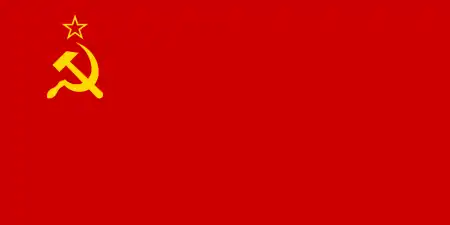 Soviet Union : Order of the Badge of Honour (1964)
Soviet Union : Order of the Badge of Honour (1964) Soviet Union : Order of Lenin (1971)
Soviet Union : Order of Lenin (1971) Soviet Union : Order of Friendship of Peoples (1981)
Soviet Union : Order of Friendship of Peoples (1981) Estonia : Collar of the Order of the Cross of Terra Mariana (2001)[14]
Estonia : Collar of the Order of the Cross of Terra Mariana (2001)[14] Estonia : Collar of the Order of the National Coat of Arms (2008)[15]
Estonia : Collar of the Order of the National Coat of Arms (2008)[15] Finland : Grand Cross of the Order of the White Rose with collar (2001)
Finland : Grand Cross of the Order of the White Rose with collar (2001) Norway : Grand Cross of the Order of St. Olav (2002)[16]
Norway : Grand Cross of the Order of St. Olav (2002)[16] Poland : Great Cross of the Order of the White Eagle[17]
Poland : Great Cross of the Order of the White Eagle[17] Portugal : Grand Collar of the Order of Prince Henry (2003) [18]
Portugal : Grand Collar of the Order of Prince Henry (2003) [18] Luxembourg : Great Cross of the Order of Adolphe of Nassau (2003)
Luxembourg : Great Cross of the Order of Adolphe of Nassau (2003) Iceland : Knight Grand Cross of the Order of the Falcon (2004)
Iceland : Knight Grand Cross of the Order of the Falcon (2004) Slovakia : Grand Cross (or 1st Class) of the Order of the White Double Cross (2005)[19]
Slovakia : Grand Cross (or 1st Class) of the Order of the White Double Cross (2005)[19] Portugal : Grand Collar of the Order of Saint James of the Sword (2006) [18]
Portugal : Grand Collar of the Order of Saint James of the Sword (2006) [18] Italy : Knight Grand Cross with Grand Cordon of the Order of Merit of the Italian Republic[20]
Italy : Knight Grand Cross with Grand Cordon of the Order of Merit of the Italian Republic[20] Latvia : Commander Grand Cross with Chain of the Order of Three Stars
Latvia : Commander Grand Cross with Chain of the Order of Three Stars Lithuania : Grand Cross with Golden Chain of the Order of Vytautas the Great (30 September 2004)[21]
Lithuania : Grand Cross with Golden Chain of the Order of Vytautas the Great (30 September 2004)[21] Philippines : Gusi Peace Prize for Statesmanship (27 November 2013)[22]
Philippines : Gusi Peace Prize for Statesmanship (27 November 2013)[22]
Gallery
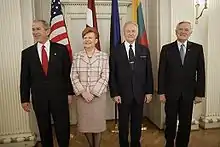
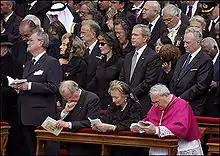 Rüütel with Albert II and Queen Paola of Belgium, Prince Henrik of Denmark, Bernadette Chirac, President Jorge Sampaio of Portugal, President George W. Bush and First Lady Laura Bush of the United States, and President Gloria Macapagal-Arroyo of the Philippines at the funeral of John Paul II.
Rüütel with Albert II and Queen Paola of Belgium, Prince Henrik of Denmark, Bernadette Chirac, President Jorge Sampaio of Portugal, President George W. Bush and First Lady Laura Bush of the United States, and President Gloria Macapagal-Arroyo of the Philippines at the funeral of John Paul II. Arnold Rüütel with Vladimir Putin and Patriarch Alexy II in January 2005.
Arnold Rüütel with Vladimir Putin and Patriarch Alexy II in January 2005. Arnold Rüütel and his wife Ingrid Rüütel at the XXV Estonian Song Festival (Laulupidu) in 2009.
Arnold Rüütel and his wife Ingrid Rüütel at the XXV Estonian Song Festival (Laulupidu) in 2009.
References
- Profile of Arnold Rüütel
- Pao, Bruno (May 10, 2018). "Arnold Rüütel 90" (in Estonian). Meie Maa. Retrieved February 2, 2020.
- "ARNOLD RÜÜTEL, President of the Republic of Estonia". The President of the Republic of Estonia. Retrieved February 2, 2020.
- "REIN TAAGEPERA: Meil on õigus teada – Eesti Päevaleht Online". Archived from the original on September 26, 2007. Retrieved September 24, 2006.
- Nikolai Adashkevich, "Estonia leader shocked by granddaughters' palace parties-paper", RIA Novosti, January 20, 2006.
- "Eesti Ekspress / Rüütel käsutas KGB Desintegraatori kallale". Archived from the original on September 27, 2007. Retrieved September 8, 2006.
- The President of the Republic of Estonia 2001–2006: Statement of the President of the Republic of Estonia on September 5, 2006 Archived September 27, 2007, at the Wayback Machine
- DELFI: Rüütel kandideerib teiseks ametiajaks
- "Ilves suurendas oma edumaad Rüütli ees – Eesti Päevaleht Online". Archived from the original on September 26, 2007. Retrieved September 25, 2006.
- "Arnold Rüütel toetab presidendiks Mart Helmet". Delfi. Retrieved November 30, 2017.
- "Arnold Rüütel peab parimaks presidendikandidaadiks Mart Helmet". www.ohtuleht.ee. Retrieved November 30, 2017.
- https://www.akorda.kz/ru/events/glava-gosudarstva-nursultan-nazarbaev-prinyal-eks-prezidenta-estonskoi-respubliki-arnolda-ryuitelya
- "Former Estonian president sends message on support of Moldova's European aspirations". president.md. Retrieved November 3, 2020.
- "Vabariigi President". www.president.ee. Retrieved August 17, 2019.
- "Vabariigi President". www.president.ee. Retrieved August 17, 2019.
- "Tildelinger av ordener og medaljer". www.kongehuset.no (in Norwegian). Retrieved August 17, 2019.
- "Postanowienie Prezydenta Rzeczypospolitej Polskiej z dnia 12 marca 2002 r. o nadaniu orderu". prawo.sejm.gov.pl. Retrieved August 17, 2019.
- Portuguese President's website
- Slovak republic website, State honours Archived April 13, 2016, at the Wayback Machine : 1st Class received in 2005 (click on "Holders of the Order of the 1st Class White Double Cross" to see the holders' table)
- "Le onorificenze della Repubblica Italiana". www.quirinale.it. Retrieved August 17, 2019.
- Lithuanian Presidency Archived April 19, 2014, at the Wayback Machine, Lithuanian Orders searching form
- President Arnold Rüütel got the Gusi Peace Prize in the Statesmanship category (delfi.ee - news in Estonian)
External links
| Wikimedia Commons has media related to Arnold Rüütel. |
| Political offices | ||
|---|---|---|
| Preceded by Johannes Käbin |
Chairman of the Presidium of the Supreme Council of Estonian SSR 1983–1990 |
Succeeded by Office abolished |
| Preceded by Lennart Meri |
President of Estonia 2001–2006 |
Succeeded by Toomas Hendrik Ilves |
